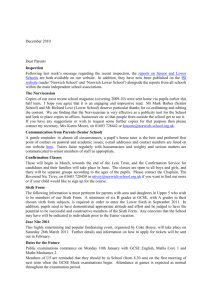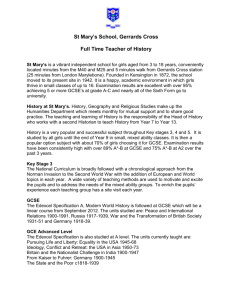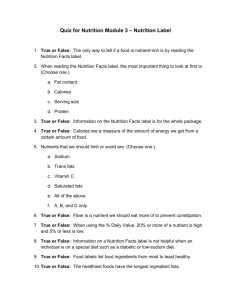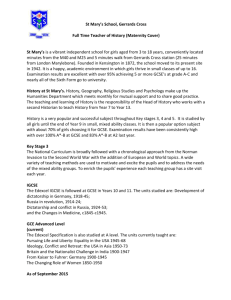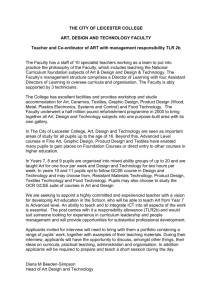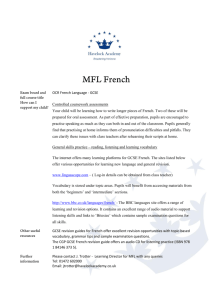Appointment of a Part Time Food & Nutrition Technician Required
advertisement
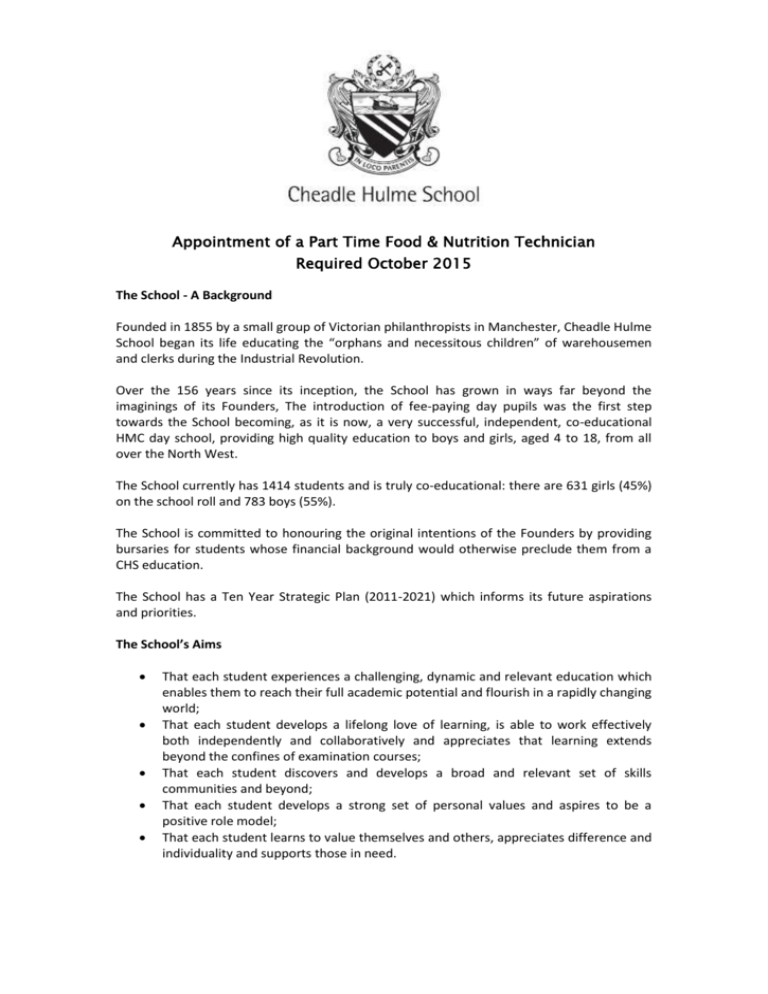
Appointment of a Part Time Food & Nutrition Technician Required October 2015 The School - A Background Founded in 1855 by a small group of Victorian philanthropists in Manchester, Cheadle Hulme School began its life educating the “orphans and necessitous children” of warehousemen and clerks during the Industrial Revolution. Over the 156 years since its inception, the School has grown in ways far beyond the imaginings of its Founders, The introduction of fee-paying day pupils was the first step towards the School becoming, as it is now, a very successful, independent, co-educational HMC day school, providing high quality education to boys and girls, aged 4 to 18, from all over the North West. The School currently has 1414 students and is truly co-educational: there are 631 girls (45%) on the school roll and 783 boys (55%). The School is committed to honouring the original intentions of the Founders by providing bursaries for students whose financial background would otherwise preclude them from a CHS education. The School has a Ten Year Strategic Plan (2011-2021) which informs its future aspirations and priorities. The School’s Aims That each student experiences a challenging, dynamic and relevant education which enables them to reach their full academic potential and flourish in a rapidly changing world; That each student develops a lifelong love of learning, is able to work effectively both independently and collaboratively and appreciates that learning extends beyond the confines of examination courses; That each student discovers and develops a broad and relevant set of skills communities and beyond; That each student develops a strong set of personal values and aspires to be a positive role model; That each student learns to value themselves and others, appreciates difference and individuality and supports those in need. Curriculum Cheadle Hulme School is an academically selective school which prides itself on providing a challenging academic curriculum, aiming to stretch and develop the intellectual capacities of each student. The School offers a broad curriculum, which begins in the Junior School, where from Reception, children are gradually introduced to the study of particular subjects, with the emphasis on literacy and numeracy. From Year 3, students follow a subject-based curriculum which includes ten subjects. In the Senior School the curriculum is broader. In the first two years (Years 7 & 8), all students gain experience in: English, Mathematics, General Science, French or Spanish, German (Year 8), Classical Civilization, History, Geography, Religious Studies, Information Technology, Design Technology, Art & Design, Music, Food & Nutrition, Drama, P.E., Swimming and Games. In Year 9 General Science is replaced by Physics, Chemistry and Biology. All students take nine full subjects at GCSE/IGCSE which include English Language, English Literature, Mathematics and a Modern Foreign Language. Students can take either separate Sciences or the Double Award Science. They choose their other courses from a wide range of options. IGCSE is currently taken in History, French, Spanish, the Sciences (single and dual award), Mathematics, English Literature, English Language, Geography and German. In the last two years, both GCSE PE and Computer Science have been included in the range of subjects available, whilst Further Maths and Greek are available as additional subjects. Alongside the academic curriculum, Well Being is taught from Year 7 through to Year 11. At post-16, CHS offers both Advanced Level and Pre-U examination courses. Students in the Lower Sixth will take four subjects, whilst those in the Upper Sixth will normally take three. At Advanced Level, the School offers: English Language, English Literature, Pure Mathematics with Statistics or Mechanics (or a combination of both), Further Mathematics, Physics, Chemistry, Biology, Food, Nutrition & Health, Sport Science, French, German, Spanish, Latin, Classical Civilisation, Geography, History, Politics, Psychology, Art, Design & Technology, Music and Theatre Studies. Pre-U courses are followed in Business and Management, Economics and Philosophy & Theology. Alongside the academic curriculum, students in Years 12 & 13 undertake the Sixth Form Enrichment Programme. In the Upper Sixth, students take a weekly Extension Class in the subject area for which they will be applying at university. Co-Curricular Activities Great emphasis is placed on co-curricular activities; we believe in the value that the students derive from learning beyond the classroom, of developing their talents and improving their social skills through diverse activities. A House system has been recently re-introduced and there are numerous House activities encouraging participation in sport, music, drama, charitable events and academic competitions. The House structure also provides many opportunities for leadership. All students participate in the Games programme as part of their curriculum, through which they sample all the major sports. Beyond this, pupils are able to engage with a wide range of further sporting opportunities through social and team practices. The School has a justified reputation for the quality of its Music. Young musicians have a chance to play or sing in a range of choirs, the Big Band, the Concert Band, the Orchestra and numerous other ensembles. We have a long and proud tradition of dramatic productions: two major productions are staged each year as well as there being GCSE and Advanced Level showcase evenings. There is a flourishing Drama Club for younger pupils and an annual Sixth Form self-directed production. Lunchtime and after-school clubs and societies exist to give every student the opportunity to broaden themselves and their education. A wide range of educational trips are also offered with some day trips taking place during curriculum time and many longer residential visits undertaken in the holidays. Comprehensive details of these can be found in the ‘CHS Life’ section of the School’s website. School Leadership Structure The principal leadership positions in the School are the Head, the Second Master, two Deputy Heads (Teaching & Curriculum and Pupil Progress & Welfare), the Head of the Junior School, the Chief Operating Officer and the Director of Development & External Relations. THE FOOD AND NUTRITION DEPARTMENT The Food and Nutrition Department consists of 3 full-time members of teaching staff. Teaching is supported by two part-time technicians (who are employed as a job share). The Department has two food rooms, which are consistently maintained to a high standard. Equipment and resources are replaced on a regular cycle to ensure the pupils are using the safest and most hygienic tools possible. The Department was totally refurbished in 2009. The Department has an excellent record at GCSE levels, when in both 2009, 2011 and 2014 two pupils gained the highest GCSE marks in Britain and were invited to an awards ceremony held in London. The Department was also awarded the ‘Good Schools Guide’ for 2011, 2012 and in 2014 for the best results at GCSE achieved by boys taking ‘Home Economics: Food at an English Independent School’. The Department teaches all pupils in Year 8 in half-class sizes once a week for the full academic year. In Year 9, Food and Nutrition is a popular option subject with three periods in a cycle. The WJEC Home Economics: Food and Nutrition specification at GCSE is followed and the pupils have five periods each cycle in Years 10 & 11. AS Level Food, Nutrition and Health following the OCR specification was introduced in September 2013 and pupils are taught nine periods in a cycle. The A2 syllabus started in September 2014. The Department also contributes to the Sixth Form Enrichment Programme, where students follow an optional five –week course preparing them for university life in the Lower Sixth. The Department offers a range of co-curricular activities including ‘Young Chef’ club, ‘Food Pro’ club which utilises expertise from outside speakers and invited guests and a number of pupils are entered in a number of national competitions. The Department also runs a number of trips which have been specially designed for our schemes of work, which includes a visit to a local farm, a tour of a manufacturing plant and developing food skills at Slattery. The Appointment: The School seeks to appoint a part-time Food & Nutrition Technician, 18.75 hours per week from October 2015, the hours of work being: Wednesday 7.30am - 12.15pm Thursday 7.30am - 3.00pm (with a half hour unpaid lunch) Friday 7.30am - 3.00pm (with a half-hour unpaid lunch) The rate of pay is £9.38 per hour. Please see Job Description at the end of this document. Remuneration package The successful candidate will be offered an attractive salary package. Please see the full list of benefits on our website under Why CHS/Working at CHS. Application procedure A completed Application Form and a covering letter should be sent before 9am on Monday 12 October 2015, to the Human Resources Department, Cheadle Hulme School, Claremont Road, Cheadle Hulme, Cheshire, SK8 6EF. (Tel 0161 488 3330). Interviews will take place on Monday 19 October 2015. Unfortunately if you have not heard from the School in response to your application by Friday 16 October 2015, you will not have been short-listed for interview. Email applications are welcome to humanresources@chschool.co.uk (Cheadle Hulme School is committed to safeguarding and promoting the welfare of young people and expects all staff and volunteers to share this commitment. All appointments at Cheadle Hulme School are subject to clearance by the Disclosure & Barring Service and to identity and qualification checks). Job Description Job Title: Food & Nutrition Technician Reports to: Head of Food & Nutrition The post is part-time, term-time only. The job-holder should be in sympathy with the aims of the School, and as part of the School community take general responsibility for promoting and safeguarding the welfare of children and young persons, and be a positive and helpful member of the School support team. Job Purpose: To provide support for the high quality teaching within the Food & Nutrition Department, through the ordering and preparation of materials and equipment for practical work and coursework and the maintenance of resources. Main responsibilities: 1. To assist teaching staff in the preparation of materials for coursework and practical work, setting up demonstrations as necessary, including laundry of cloths; 2. To ensure smooth running of lessons by ensuring all pupil units are fully stocked and cleaned before and after each lesson; 3. To ensure safe storage of pupils’ practical work and arrange for collection at the end of the school day; 4. To keep equipment in the work areas clean, ensuring that work surfaces and cupboards are disinfected on a regular basis; 5. To keep daily records of all departmental refrigeration and frozen storage areas; 6. To check food stores are rotated and sell-by/use-by dates are adhered to; 7. To maintain stock levels, including the ordering of goods and services on a weekly basis; 8. To be responsible for the storage and distribution of equipment, ensuring that safety equipment/clothing is used appropriately and that it is cleaned and maintained (including annual servicing of equipment where applicable); 9. To keep up-to-date on supplies for renewal of stocks and for repairs/maintenance of equipment; 10. To update the Head of Department on all spending against departmental budgets; 11. To set up displays in the Food and Nutrition Department; 12. To undertake routine administrative tasks, including maintenance of the Department’s filing system and resources for printing for the teaching staff; 13. To work to scheduled tasks as required by the Department daily, weekly and termly; 14. To maintain an Incident Book, acting upon comments to ensure that Health and Safety requirements are met; 15. To provide First Aid assistance as required within the Department; 16. To liaise with the Medical Centre to maintain and replenish First Aid boxes; 17. To liaise with all cleaning and maintenance staff regarding the safe use of all equipment; 18. To undertake additional duties as reasonably requested by the Head of Department. This is not an exhaustive list, and will vary as the School’s requirements change. Flexibility regarding working hours may be expected from time to time, in consultation with the employee. Person Specification – Food & Nutrition Technician Qualifications educated to GCSE level familiar with food safety legislation, ideally holding a Certificate in Food Hygiene prepared to undertake First Aid at Work Certificate Experience and knowledge previous experience of working with food excellent working knowledge of ICT, including Word, Excel, and email Skills and competencies The job-holder should be able to: take initiative work well within a team plan, organise and prioritise effectively think and work creatively cope under pressure The job-holder should: have a flexible and adaptable approach to work have a good sense of humour and a patient attitude be enthusiastic and self-motivated
